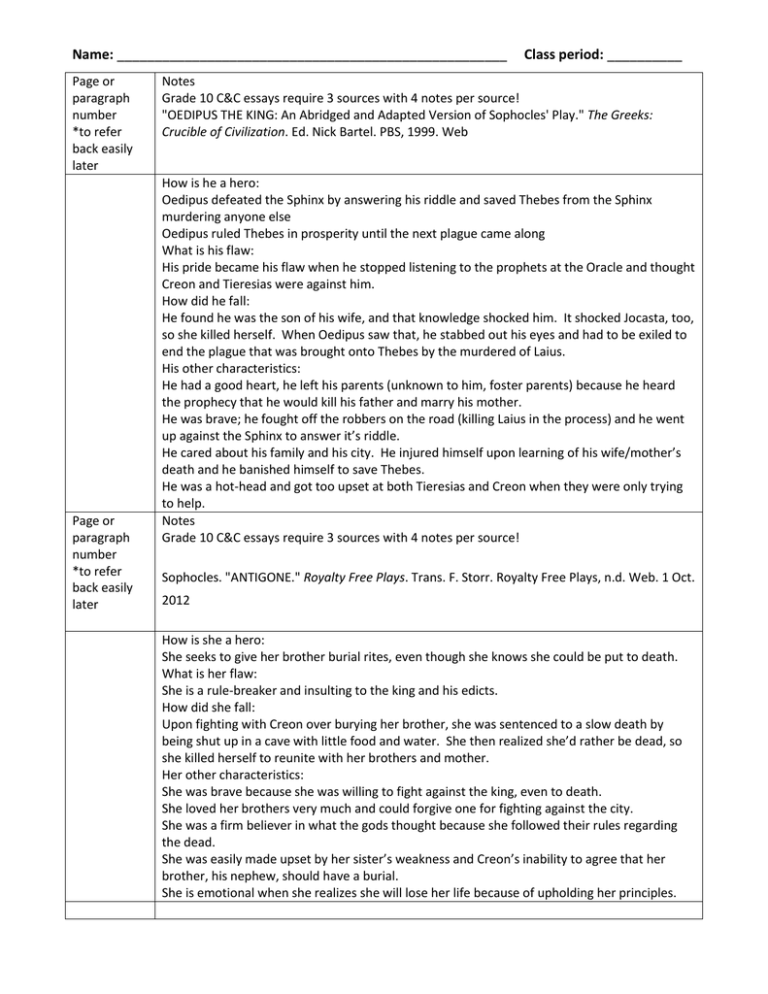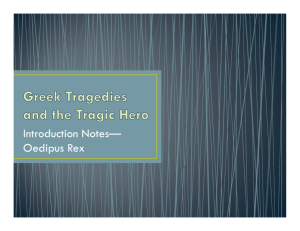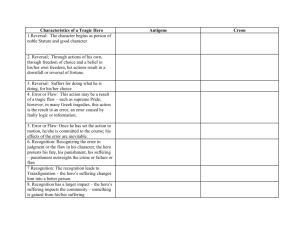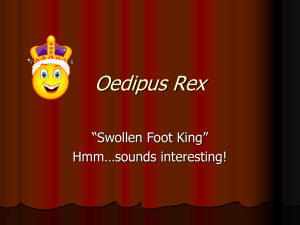Source A
advertisement

Name: ____________________________________________________ Page or paragraph number *to refer back easily later Page or paragraph number *to refer back easily later Class period: __________ Notes Grade 10 C&C essays require 3 sources with 4 notes per source! "OEDIPUS THE KING: An Abridged and Adapted Version of Sophocles' Play." The Greeks: Crucible of Civilization. Ed. Nick Bartel. PBS, 1999. Web How is he a hero: Oedipus defeated the Sphinx by answering his riddle and saved Thebes from the Sphinx murdering anyone else Oedipus ruled Thebes in prosperity until the next plague came along What is his flaw: His pride became his flaw when he stopped listening to the prophets at the Oracle and thought Creon and Tieresias were against him. How did he fall: He found he was the son of his wife, and that knowledge shocked him. It shocked Jocasta, too, so she killed herself. When Oedipus saw that, he stabbed out his eyes and had to be exiled to end the plague that was brought onto Thebes by the murdered of Laius. His other characteristics: He had a good heart, he left his parents (unknown to him, foster parents) because he heard the prophecy that he would kill his father and marry his mother. He was brave; he fought off the robbers on the road (killing Laius in the process) and he went up against the Sphinx to answer it’s riddle. He cared about his family and his city. He injured himself upon learning of his wife/mother’s death and he banished himself to save Thebes. He was a hot-head and got too upset at both Tieresias and Creon when they were only trying to help. Notes Grade 10 C&C essays require 3 sources with 4 notes per source! Sophocles. "ANTIGONE." Royalty Free Plays. Trans. F. Storr. Royalty Free Plays, n.d. Web. 1 Oct. 2012 How is she a hero: She seeks to give her brother burial rites, even though she knows she could be put to death. What is her flaw: She is a rule-breaker and insulting to the king and his edicts. How did she fall: Upon fighting with Creon over burying her brother, she was sentenced to a slow death by being shut up in a cave with little food and water. She then realized she’d rather be dead, so she killed herself to reunite with her brothers and mother. Her other characteristics: She was brave because she was willing to fight against the king, even to death. She loved her brothers very much and could forgive one for fighting against the city. She was a firm believer in what the gods thought because she followed their rules regarding the dead. She was easily made upset by her sister’s weakness and Creon’s inability to agree that her brother, his nephew, should have a burial. She is emotional when she realizes she will lose her life because of upholding her principles. Name: ____________________________________________________ Page or paragraph number *to refer back easily later Class period: __________ Notes Grade 10 C&C essays require 3 sources with 4 notes per source! "Aristotle & The Elements of Tragedy: English 250." Aristotle's Tragic Terms. N.p., n.d. Web. 25 Aug. 2012. <http://www.ohio.edu/people/hartleyg/ref/aristotletragedy.html>. The philosopher Aristotle defined tragedy as the downfall of a noble hero or heroine, usually through some combination of hubris (pride), fate, and the will of the gods…. Aristotle says that the tragic hero should have a flaw and/or make some mistake (hamartia). The hero need not die at the end, but he/she must undergo a change in fortune….Aristotle quite nicely terms this sort of recognition "a change from ignorance to awareness of a bond of love or hate.” The tragic hero is "a [great] man who is neither a paragon of virtue and justice nor undergoes the change to misfortune through any real badness or wickedness but because of some mistake." Tragic Hero “a) a great man: "one of those who stand in great repute and prosperity, like Oedipus and Thyestes: conspicuous men from families of that kind." The hero is neither a villain nor a model of perfection but is basically good and decent.” “b) "mistake" (hamartia): This Greek word, which Aristotle uses only once in the Poetics, has also been translated as "flaw" or as "error." The great man falls through--though not entirely because of--some weakness of character, some moral blindness, or error. We should note that the gods also are in some sense responsible for the hero's fall.”






